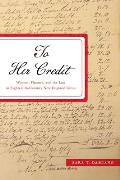A Study of Women, Finance, and the Law in Newport and Boston
H-Early-America just published Prof. Linda Sturtz’s review of Sara T. Damiano’s To Her Credit: Women, Finance, and the Law in Eighteenth-Century New England Cities (Johns Hopkins University Press, 2021).
Damiano studied women’s economic pursuits in Boston, Massachusetts, and Newport, Rhode Island, across the eighteenth century, delving most deeply into legal records.
Sturtz’s review notes some of the results:
Damiano is now a professor at Texas State University. Her current project “investigates interactions between officers of the law and laypeople, both free and enslaved, in early American cities.”
Damiano studied women’s economic pursuits in Boston, Massachusetts, and Newport, Rhode Island, across the eighteenth century, delving most deeply into legal records.
Sturtz’s review notes some of the results:
Damiano sampled a vast collection of cases heard by the Newport and Suffolk County courts between 1730 and 1790, assembling a total of over 1,800 cases for each location to identify the significance of debt suits as a percentage of the total cases (around 75 percent). . . . Between 1730 and the Revolutionary War, women made up 12 percent of the participants in the debt suits in Newport County and 9 percent of the litigants in…Suffolk County (p. 180). Her database allows her to trace incremental change over time as well as the impact of more abrupt events like war and postwar economic depressions on family finances. . . .There’s a lot more to the review, including discussion of other scholarly books about American women in business (and in litigation) during the eighteenth century.
For example, she shows the importance of female witnesses who were often bystanders to transactions that escalated into court cases because financial exchanges occurred in spaces women frequented, especially homes but also in heterosocial public spaces. . . . men in these port cities engaged in both local and long-distance transactions while women’s cases were generally limited to a more local focus. Women were overrepresented as creditors in debt suits and benefited from courts’ increasing support of creditors. . . .
Damiano’s argument connects to several historiographical debates, most notably the literature on gender, the economy, and the law in New England. . . . After the revolution, according to Damiano, wealthy Newport and Boston women who were creditors in suits increasingly hired professional lawyers to shepherd their cases through the legal system while the women themselves took advantage of their privilege to retreat from direct involvement.
Damiano is now a professor at Texas State University. Her current project “investigates interactions between officers of the law and laypeople, both free and enslaved, in early American cities.”


No comments:
Post a Comment